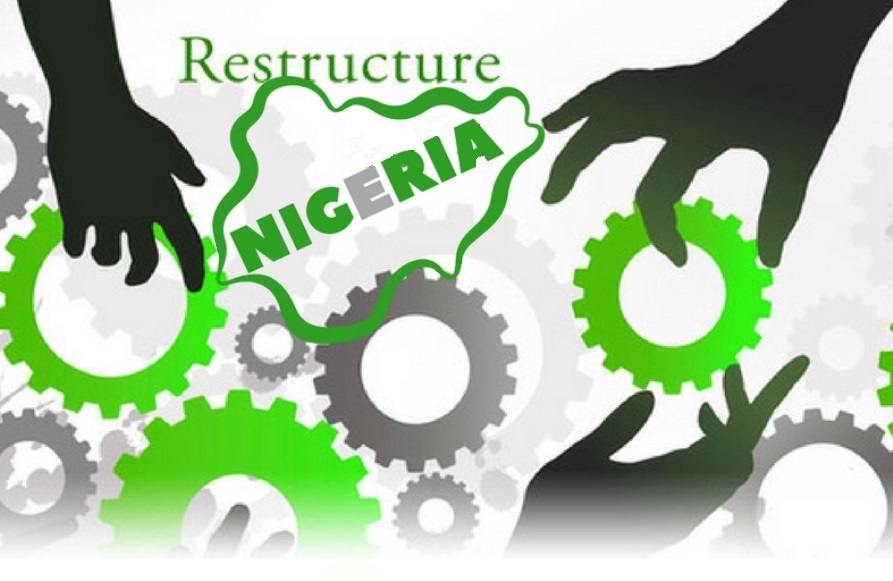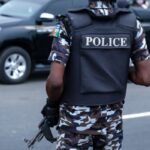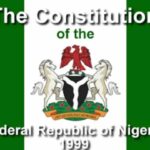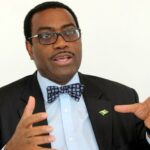Over time, Nigeria has come under the colossal weight of agitations from different geopolitical zones, sociopolitical groups as well as ethnic nationalities with increasing clamour for restructuring of the country.
The pro-restructuring voices have continued to press for equity, fairness and justice which, they believe, will come in form of restructured polity which guarantees more power to sub-national structures, as a way of entrenching national unity and democratic ethos.
- Oba of Benin, Obaseki differ on repatriation of looted artifacts
Nigeria makes history, shock US in pre-Olympic basketball friendly
The recurring sociopolitical and economic crises as well as insecurity challenges bedeviling the nation have been variously attributed to marginalization of certain regions in the scheme of things in the nation’s corporate existence.
The clamour and agitations have gotten to a boiling point with the rise in demand for self-determination through secession and or separatism.
For the agitators, if the country must remain united and enjoy relative peace and stability, then, the solution is restructuring through referendum. This has been the key demand of the agitators.
Another demand which is also on the front burner is clamour for constitutional review which is crucial to restructuring.
But counter voices say there is nothing that needs restructuring, insisting that the status quo is the best for the country. They also accuse promoters of restructuring of confusion as they say there are no clear cut demands, and how to go about implementation.
Against this backdrop, some sociopolitical groups, experts and political analysts in this report, unequivocally state how their demands can be implemented.
The groups which include pan Yoruba socio-political organization, Afenifere, the apex Igbo socio-cultural group, Ohaneze Ndigbo, as well as the South-South Zone sociopolitical organization, Pan Niger Delta Forum, (PANDEF) are unanimously asking for devolution of powers through restructuring of the country.
Afenifere insists: “Restructuring which heralds true federalism and bestows self-determination on the constituent parts of the country is the wand to prevent Nigeria from sinking into the dungeon. Indeed, it is the only recipe to get it out of the self-inflicted trauma it is going through currently.”
The National Publicity Secretary of the organization, Comrade Jare Ajayi, in a chat with Daily Trust on Sunday demanded a return to a “truly federal constitution” which was in practice in the First Republic.
The group proposed United Regions of Nigeria (URN). “Nigeria should be organized into a union or a federation of voluntarily associating and cooperative regional entities as we had up till 1966.
“Unlike what we have currently, each region may have a constitution of its own, which would spell out how it is to be governed. There would be a national constitution which binds all the regions in the country together. In this latter, the constitution would spell out mutually agreed terms under which the people of the country agree to cohabit together as citizens of the same country.
“Afenifere is proposing a template that would make it possible for every ethnic nationality to organize themselves and prepare terms that would guide their relationship with other ethnic nationalities in the country in a harmonious and mutually respecting manner. From such a collation of terms would emerge regional constitutions out of which the national constitution would be forged,” he said.
Ajayi added that the constitution, whether regional or national, “must accord unqualified respect to democratic norms and the rights of the people to actively participate in matters that have to do with their lives.”
“The constitutions must also emphasize true federalism in such a way that no region or area would have power to lord it over another region or area.
“The product of this process should then produce the document that will become the constitution of the United Regions of Nigeria or Federal Republic of Nigeria. As stated earlier, the issue of true federalism must be central in every of the constitution or article of engagement so produced, a true federalism that emphasizes self-determination,” he added.
To actualize the proposal, he stated that ethnic nationalities in the country should be allowed to prepare their document on terms of engagement between now and December 2021.
According to him, the documents from the nationalities in which they propose the kind of regional government they want to form can be collated and considered between January and March 2022.
“A national referendum can be conducted on the adoption of the final constitution for the restructured Nigeria around the middle of 2022. The product of the referendum would then be passed into law by the National Assembly, while the said law should become effective from October 01, 2022.
“Among the expected contents of the envisaged constitutions are unreserved powers of the regions over natural resources in their respective areas, agriculture, education, health, electricity, security and economy etc.
“It is hereby further proposed that each region furnishes 10 percent of what it generates to the national purse. The region retains 30 per cent; the states take 35 per cent, while the local governments take 25 per cent,” he added.

Why Nigeria should be restructured – PANDEF
PANDEF says its position on the restructuring of Nigeria remains sacrosanct and unwavering.
The National Publicity Secretary, Ken Robinson, said that Nigeria needed to be restructured from the military- imposed 1999 Constitution and the lopsided structure of the country.
He added that the present structure of Nigeria was grossly defective and inappropriate for a heterogeneous society like Nigeria.
He stressed that restructuring had, therefore, become not only imperative but a necessity.
“While we agree to a united and indivisible Nigeria, it must, however, be based on equity, fairness and justice.”
He said restructuring will douse agitation and tension in the country.
Robinson said that PANDEF’s three pillars of restructuring deal with the critical alterations to the 1999 Constitution and the structure of the country.
He listed the three pillars as true federalism and power devolution, fiscal federalism, derivation and resource control as well as the federation and tiers of government.
“We are demanding that the Second Schedule Part 1 of the 1999 Constitution (the Exclusive Legislative List) should be amended. That at least, 40 of the 68 items listed should be moved to the concurrent list, including Item 39, which deals with mines and minerals, including oil fields, oil mining, geological surveys and natural gas.
“The control of mining and mineral resources, both onshore and offshore, should be vested in the states, which would then pay applicable royalties and taxes to the federation account for distribution,” he said.
PANDEF also maintained that funding, administration and creation of local government areas should be left to the federating units. It noted that the states should determine, develop and enact laws for the local government system and its structure, depending on the peculiarities and needs of each state.
“There should be only two tiers of government; the federal or central government and the states as the federating units. Having three tiers of government in a federal system is an abnormality. Local governments should not constitute a tier of government as is currently the case.
“Accordingly, Chapter 1, Part 1, Section 1, (6) of the 1999 Constitution should be expunged; the 774 local government areas listed in the first schedule, part 1 of the 1999 constitution should be removed.
Robinson said PANDEF was in support of the establishment of state police. He added that policing and internal security should be the constitutional responsibilities of both federal and state governments as is the practice in all major federations such as the United Kingdom, United States of America, Canada, India, Germany, Switzerland and Australia.
“Item 45 of the Exclusive List dealing with police and other government security services established by law should be moved to the Concurrent List to allow for the establishment of state police,” Robinson said.
He called for the amendment of Chapter 6, Part 3, Section 214 of the constitution which states: “There shall be a police force
for Nigeria which shall be known as the Nigeria Police Force and subject to the provisions of this section no other police force shall be established for the Federation or any part thereof.”
PANDEF also called for the amendment of the Electoral Act, with the inclusion of provisions for electronic accreditation, voting and transmission of votes before the 2023 General elections to guarantee a free, fair and credible elections.
“We are in a constitutional democracy. Therefore, a sincere constitutional amendment process could be the simplest path to restructuring,” he added.
Ohaneze Ndigbo wants devolution of powers
The Ohaenze Ndigbo believes that restructuring of the country was the only way forward.
The Vice President General of the group, Chief Damian Ogene–Okeke, said that the group was seeking devolution of power to the region.
He insisted that power must go to the component bodies to give Nigerians the desired needs to move the country forward.
“We need to allow the various component bodies in the country to manage their resources. Nobody is talking about the Presidency but allow the people to manage their resources and pay to the federal government,” he said.
Nigeria may go the path of former Soviet Union – Dons
An associate professor of Political Science, Dr Gbade Ojo, however, said that the agitations across the country by ethnic nationalities triggered the clamour for restructuring.
He warned that unless the country was restructured, “Nigeria may go down the path of the former Soviet Union”.
“The Soviet Union was contracted in 1914 by Joseph Stalin. That was the year Nigeria’s amalgamation was done. By the early 80s, Soviet Union disintegrated. So, if Nigerians had been dragging on since 1914 and we were made a federal country since 1954 and we got independence in 1960 and Republican constitution in 1963, if since that time, Nigerians are not satisfied and the federal arrangement looks like a marriage of inconvenience, it is better we sit down and negotiate the terms of our marriage if we want to go as a married couple.”
Also speaking with Daily Trust on Sunday, renowned constitutional lawyer Itse Sagay, called for decentralization of power to make states less dependent on the federal government.
“I think the federation we are running is too tight. We need a more relaxed, more loose federation to give powers to the federating units to exercise more powers and to do things on their own. They are only to refer to the Federal Government in the extreme cases.
“For example, there is no reason the states cannot have their own police. There are so many other things that the states should do. For example, on the issue of resource control, there is no reason we should all be going to Abuja once a month to share money and that money is collected from us, the states, only to be divided again. Why don’t you keep your money and then contribute a portion of it to the Federal Government for running the Federal Government and then another portion to be divided among states that are not sufficiently endowed?
A Port Harcourt-based analyst, Ignatius Chukwu, said that the call for restructuring had deep implications for the polity.
According to him, it serves as a rallying point against government in power.
Chukwu added that the call for restructuring had become a platform for agitation and for opposing the government in power.
“The call may lead to dividing the country along north-south axis as well as pro-government and anti-government lines. The call could also launch Nigeria for once into politics of ideology,” he said.
He said if implemented, the restructuring could help douse the agitation for breakup. He expressed doubt if the present administration had enough time to implement the demands.
Restructuring not new – Don
A former Vice President of the Nigerian Political Science Association (NPSA), Professor Kamilu Sani Fage, noted that restructuring was not a new thing, but has only been changing colouration from one demand to the other.
“In the 50s, the idea of restructuring had to do with protecting the rights of the minorities to ensure they are not dominated up till the time we have the Willink Commission.
“Now, the proponents of restructuring are looking at it from different perspectives. Some are after balanced federalism, while some are after resource control and some are talking about rotation of position. The whole idea is for Nigerians to sit down since we have the National Assembly which is the constitutionally empowered body for this kind of matter,” he said.
Fage, a professor of Political Science with interest in public administration at Bayero University, Kano (BUK), said that unless the constitution was reviewed, some of the issues could not be fixed. He noted that referendum was not constitutional as being called for by some people.
“Anything contrary to going through the National Assembly is a recipe for chaos and it is going to be unconstitutional. By now, Nigerians should be more concerned about national unity than micro-nationalism,” he said.
Dr Aminu Hayatu, a lecturer in the Department of Political Science in Bayero University, Kano, said democratic government was supposed to be the government of the people.
He added that since there are clamour and agitations within the state and tensions in the federal polity, the first step of the government should not be suppressive but consultation.
But the National Assembly should articulate the problems.
Restructuring fuelled by selfish interest
A professor of Political Science, University of Maiduguri, Umara Ibrahim, said that the clamour for restructuring was a product of selfish interest by people who do not know the value of federalism.
“If the politicians were federalists, nobody would be clamouring for marginalization or restructuring. These religious, ethnic and regional champions never see anything good coming from anybody apart from people that come from their region, section or religion. These people are so dangerous for the existence of the country,” he said.
“Otherwise, there is nothing wrong with the existing federal structure. What is wrong is how to deliver and implement policy options,” he added.
NASS continues with Constitution Amendment
The National Assembly, from the 5th session, had made several attempts to amend the 1999 Constitution to make it consistent with the agitations and aspirations of Nigerians.
These agitations, as canvassed by several groups in different parts of the country, focused on issues of the country’s governance system.
Such constitutional issues include independent candidacy to contest for any elective office; creation of state police, federal structure and power devolution, fiscal federalism and revenue allocation, judicial and electoral reforms, full local government fiscal autonomy, state creation, youth inclusiveness in governance, gender parity.
While some amendments were successful, several others suffered serial failure.
There were unsuccessful attempts to amend the Second Schedule of the Constitution to devolve more powers to the states by reorganizing the Legislative Lists to move Railway, Aviation, Power, Stamp Duty, among others from the Exclusive List to the Concurrent List.
Other failed amendments are the inclusion of electoral offences as a ground to disqualify candidates from future elections; mandatory presentation of the yearly state of the nation address to a joint session of the National Assembly by the president; removal of presidential assent to constitution amendment bills; financial autonomy for Office of the Auditor-General of the Federation; amendments to section 59 compelling the president/governor to transmit assent/veto of a bill to parliament within 30 days, failing which such bill becomes law automatically.
Also, unsuccessful were the reduction of the period the president/governor could approve expenditure from the federal/state treasury based on the previous year’s budget (in the absence of a new budget) from six to three months; timeframe for submission of ministerial nominees, which must also be accompanied with their respective portfolios; compulsory saving of a defined percentage of oil revenues for the rainy day; decentralisation of policing to create state police; single term of five/six years for president and governors; abrogation of the immunity clause; removal of the Land Use Act from the constitution; devolution of the Prisons (now known as the Nigerian Correctional Service) and state creation.
Despite these efforts, many Nigerians still hold the view that no significant amendments had been made to address the yearnings of the citizens.
In the current National Assembly, dozens of bills and hundreds of memoranda covering a range of issues were seeking to amend provisions of the constitution to address the restructuring agitations.
“This constitution amendment process is an attempt by the National Assembly to respond to these demands within the context of the powers conferred on it by the Constitution in a manner that will further strengthen our democracy,” Senator Ovie Omo-Agege, who chairs the Senate Constitution review committee, had said while unveiling his panel agenda in 2020.
In reviewing the constitution, the current legislature listed 13 thematic areas it focused on to include: gender equality for women and girls; federal structure and power devolution; local government and its autonomy; public revenue, fiscal federation and revenue allocation; Nigerian Police and Nigerian security architecture as well as comprehensive judicial reforms.
Others are: electoral reforms; socio-economic and cultural rights as contained in Chapter 2 of the Constitution; strengthening the Independence of oversight institutions and agencies created by the constitution or pursuant to an act of the National Assembly; residency and indigene provisions; immunity; National Assembly and state creation.
The current structure, they said, overburdens the federal government with too many responsibilities which it cannot efficiently handle.
Some argued that the states (federating units) should be allowed to own the resources in their states and pay tax to the federal government as applicable in other climes. Others said it would be more ideal for the states to have their law enforcement agencies.
There are several hurdles that must be crossed for the current attempt at amending the constitution to sail through.
The Senate and House of Representatives will consider and vote on proposed amendments. The approved amendments must still be endorsed by 2/3 of the state assemblies (24 of the 36) as well as be assented to by the President.
Nigerians are watching keenly if the current attempt at addressing the issues on the country’s governance structure through constitutional amendments would be successful.
From Abiodun Alade & Abdullateef Aliyu (Lagos), Victor Edozie (Port Harcourt), Titus Eleweke (Awka), Clement A. Oloyede (Kano), Misbahu Bashir (Maiduguri) & Abdullateef Salau (Abuja)

 Join Daily Trust WhatsApp Community For Quick Access To News and Happenings Around You.
Join Daily Trust WhatsApp Community For Quick Access To News and Happenings Around You.


